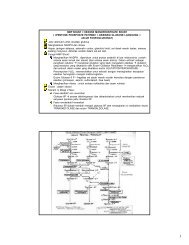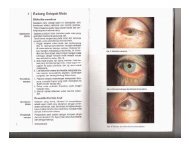International Handbook of Clinical Hypnosis - E-Lib FK UWKS
International Handbook of Clinical Hypnosis - E-Lib FK UWKS
International Handbook of Clinical Hypnosis - E-Lib FK UWKS
You also want an ePaper? Increase the reach of your titles
YUMPU automatically turns print PDFs into web optimized ePapers that Google loves.
100 INTERNATIONAL HANDBOOK OF CLINICAL HYPNOSIS<br />
this respect, it does not seem to be possible to distinguish between people who do<br />
not report abuse and those who do not remember it; among the latter, it does not<br />
seem possible to distinguish forgetting that re¯ects repression, dissociation, other<br />
pathological processes, and benign processes Kihlstrom, 1995). Nevertheless,<br />
when clinicians are faced with clients who experience themselves remembering a<br />
previously forgotten trauma, they must recognize the clinical relevance <strong>of</strong> this;<br />
equally, however, clinicians need to recognize that memories are affected by factors<br />
like suggestion, transference, personal values, social interactions, and fantasies<br />
associated with the event and its remembering Nash, 1994).<br />
Whatever their nature, it is clear that memories and the meaning placed on them<br />
change during therapy in various ways. For instance, Foa, Molnar, and Cashman<br />
1995) examined the memory reports <strong>of</strong> female rape victims during therapy, and<br />
found that their length increased across treatment, the percentage <strong>of</strong> reported<br />
actions and dialogue decreased, and the percentage <strong>of</strong> thoughts and feelings<br />
increased. There was an increase in the number <strong>of</strong> thoughts that attempted to<br />
structure the memory <strong>of</strong> rape. Thus, their narratives changed with the imaginal<br />
reliving <strong>of</strong> the trauma, and the victims tried to restructure their memory to provide<br />
a sense <strong>of</strong> coherence. That coherence may give a strong feeling <strong>of</strong> narrative truth<br />
and may feel right for both the client and the clinician, but it may not be an<br />
indication <strong>of</strong> the historical truth <strong>of</strong> the event. The fact that narrative and historical<br />
truth Spence, 1982, 1994) may not coincide is nonproblematic and manageable by<br />
clinicians with relevant knowledge and skill. However, it may be problematic in<br />
nonclinical settings, such as the courtroom, in which the processes, goals, and<br />
demands are very different from the clinical setting. As Spiegel & Sche¯in 1994)<br />
noted, it is possible to convince oneself <strong>of</strong> a false belief, and memory alone cannot<br />
be trusted in the absence <strong>of</strong> independent corroboration.<br />
Questions about the trust that can be placed in recovered memory and the utility<br />
<strong>of</strong> such memory in clinical and court settings have led to research on whether<br />
memories <strong>of</strong> childhood abuse can be recovered. While recognizing that childhood<br />
sexual abuse can cause signi®cant physical and emotional harm Jan<strong>of</strong>f-Bulman,<br />
1992; Kendall-Tacket, Williams & Finkelhor, 1993; Nash, Hulsey, Sexton, Harralson<br />
& Lambert, 1993; Romans, Martin, Anderson, O'Shea & Mullen, 1995),<br />
recovered memories <strong>of</strong> abuse cannot be seen as self-validating. Rather, the nature<br />
and accuracy <strong>of</strong> memories recovered during therapy need to be determined<br />
independently instead <strong>of</strong> being assumed by the client, the clinician, or others; this<br />
is especially the case when dealing with those therapies that may strongly bias the<br />
creation <strong>of</strong> illusory memories Lindsay & Read, 1994). As Bowers & Farvolden<br />
1996) noted, however, the situation becomes complicated if clinicians accept abuse<br />
memories at face value; sometimes clinicians do this because they feel they must<br />
serve the client by con®rming each <strong>of</strong> his or her ideas, memories, and beliefs. This<br />
tendency by some clinicians is unfortunate not only because it may lead clients to<br />
assume the validity <strong>of</strong> memories that may not be accurate, but also because it<br />
conveys that the clinician knows the truth about the client. As Bowers & Farvolden











![SISTEM SENSORY [Compatibility Mode].pdf](https://img.yumpu.com/20667975/1/190x245/sistem-sensory-compatibility-modepdf.jpg?quality=85)





